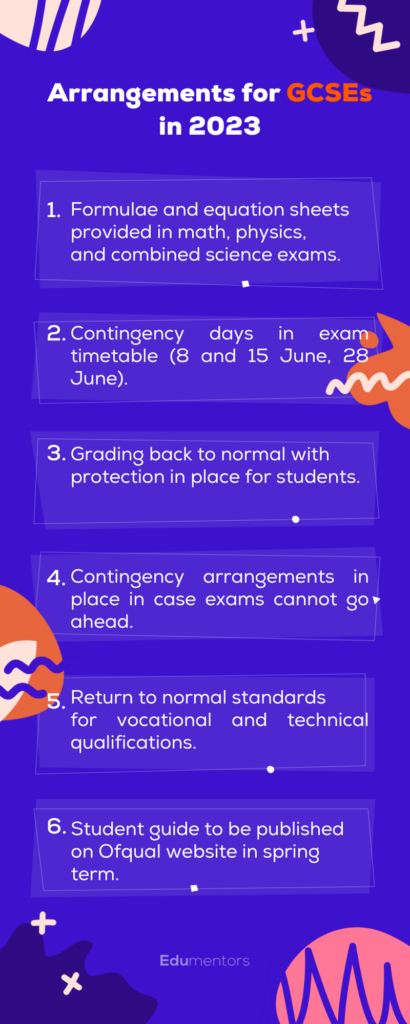Table of Contents:
- Will There Be Changes to GCSE 2023?
- Will GCSE Students Get Advanced Information?
- Will GCSE Students Get Formulae Sheets in 2023?
- Will GCSE Grades Fall Back to Pre-Pandemic Grades?
- Plan B for GCSE 2023
- What is the Hardest Exam Board for GCSE 2023?
- When are GCSEs 2023?
- GCSE Maths 2023 Dates
- GCSE Results Day 2023
- When Should Students Start Revising for GCSE 2023?
- GCSE Past Papers – Effective Revision for GCSE 2023
- To Sum Up
Will There Be Changes to GCSE 2023?
Formal assessments, including GCSE 2023, will gradually return to normal as England moves on from the pandemic. It is now unlikely that schools will close or exams are cancelled, as the national return to exam-oriented learning has come. The government does not intend for exams to ever be cancelled but recognises that contingency plans are necessary in case of unexpected events.
Ofqual has confirmed that in 2023 a pre-pandemic grading scale will be reinstated for GCSE exams. However, the government has announced that it will offer support to students taking GCSEs in 2023, recognising the disruption caused by the pandemic.
Here’s everything you need to know about GCSEs in 2023:
Will GCSE Students Get Advanced Information?
In 2022, the exam boards released topics for some papers in advance to help students who had been impacted by the pandemic. This practice will not feature again next year, Ofqual has confirmed that there will be no advanced information for GCSE students in 2023. The reasoning behind this conclusion is that students have experienced less disruption due to Covid-19 than in previous years.
While Ofqual has confirmed that there will be no advanced information for GCSE students in England in 2023, pupils in Northern Ireland taking GCSE, AS and A-level exams in 2023 have been given advance information for most subjects, as published by the Council for the Curriculum, Examinations and Assessment (CCEA). However, it’s important to note that this decision only applies to Northern Ireland and not to other parts of the UK, such as England, Wales, or Scotland.
Will GCSE Students Get Formulae Sheets in 2023?
Yes! Formulae and equation sheets will be provided for GCSE exams in 2023. In acknowledgement of the disturbance caused by exam season, this support will be offered to students taking GCSE exams in 2023.
The subjects that formulae sheets and equation sheets are provided for this year have remained the same as those from last year:
📌 GCSE Physics
📌 GCSE Combined Science
📌 GCSE Mathematics
Will GCSE Grades Fall Back to Pre-Pandemic Grades?

The pandemic caused a learning loss that is expected to lower GCSE and A-level grade boundaries in 2023. A grade boundary is a minimum mark pupil needs to get a certain qualification level. For example, if the grade boundary for 7 is 150 marks, students must get at least 150 marks to achieve that grade. In order to avoid unfairness in grading, senior examiners use various data such as previous cohorts’ exam results and prior attainment to set grade thresholds every year. Experts expect that grades will be lower than 2022 this year but similar to 2019’s results.
✏️ “We expect that overall results in 2023 will be much closer to pre-pandemic years than results since 2020. This decision means that results in 2023 will be lower than in 2022.” – according to Jo Saxton, the chief regulator of Ofqual.
The reason for this is that it took some pupils longer than others to get back on track. Natalie Perera, chief executive of the Education Policy Institute states that she has concerns about disadvantaged students who were affected by the learning loss during the pandemic.
✏️“Although their course of study for their qualifications may not have been affected by national closures, the years leading up to them – and providing the foundations for their courses – were significantly disrupted” – states Natalie.

Plan B for GCSE 2023
The “Plan B” guidance has been implemented by the Department for Education and Ofqual as a precautionary measure in the event that the GCSE exams are disrupted or cancelled due to the COVID-19 pandemic or other unforeseen circumstances. This guidance instructs schools and colleges to collect and retain evidence that can be used for potential teacher grades for GCSEs and A-levels. While the probability of the GCSE exams being cancelled is low, this guidance aims to ensure that students have the opportunity to obtain valid and reliable qualifications in the face of any disruptions.
What is the Hardest Exam Board for GCSE 2023?
Firstly, What Exam Boards are There in the UK?
The exam boards currently in use are – AQA, Pearson Edexcel, OCR and WJEC. They develop secondary school level qualifications such as GCSEs, A-levels, AS levels and vocational qualifications. They are also responsible for marking and awarding points.
Schools have the freedom to choose their exam board, however, most schools use a mixture of some boards, because not all boards provide all subjects. The exam board the school or college chooses will affect how a student’s course is taught and what kind of material they study.
If your child is being homeschooled, then you have to do some research into different exam boards and choose the one that seems most suitable for him or her.
To learn more about this topic, you can consult the exam boards’ guides for private candidates. The guide can be available by calling the relevant board directly or downloading a pdf from their website.
How are Exam Boards Different?
All exam boards follow the guidelines of Ofqual to ensure parity and to regulate standards. However, the layout, and format vary. To check what differences are there in a specific subject, you can visit each exam board’s website or contact them directly. However, at the end of the day, all exam boards mark students on the same skills and techniques. Even if they don’t use the same books. If you don’t plan to change your child’s secondary school and are content with their current exam board’s results, there is no need for concern. The awarding committee evaluates each exam board every year and sets grade boundaries so that no student will be treated unfairly in relation to another.
Which is the Hardest Exam Board?
Typically, the difficulty of an exam board’s content depends on a student’s learning style and the type of questions that they find easiest to answer. Each of the exams is designed for a different type of student. Hence, Edexcel may seem easier to one person than AQA does to another.
The grades students receive are a reflection of the grade boundaries that have been set by exam boards. These boundaries shift depending on how difficult an examination paper is. It’s possible for someone to earn lower marks than your child but still be awarded a higher overall grade because they’re on another board.
Students have their own favourite based on the subject. For instance, in Maths, Pearson Edexcel is the most popular. Generally, the easiest exam board for languages is considered AQA. Research each subject’s requirements and overall grades throughout the years and choose based on your child’s strengths and weaknesses.
When are GCSEs 2023?
GCSE 2023 exam timetables have been published:
📌 AQA GCSE 2023 Dates – Final
AQA’s GCSE exams start on the 15th of May and end on June 23. Contingency day is on Wednesday, 28th June.
📌 Pearson Edexcel GCSE 2023 Dates – Final
Edexcel’s GCSE exams start on the 15th of May and end on Wednesday, June 21st.
📌 OCR GCSE 2023 Dates – Final
OCR’s GCSE exams start on the 15th of May and end on the 20th of June.
GCSE Maths 2023 Dates
GCSE Results Day 2023
GCSE results day is an exciting and nerve-wracking time for students across the UK. This year, GCSE results day is scheduled for Thursday, August 24th, 2023. Students can collect their results from their school or college in the morning from 8am. However, some schools may stagger this time or email out results instead.
On GCSE results day, students will find out how they performed in their exams and whether they have achieved the grades they need to progress to their next stage of education. If a student did not achieve the grades they needed, they may be able to request a review of their marking or resit their exams.
It’s important for students to remember that results day is not the end of the road. If they did not achieve the grades they needed, there are still options available to them. They can speak to their school or college about alternative options, such as resitting exams or taking vocational qualifications. They can also seek advice from their teachers or careers advisors on the next steps to take.
When Should Students Start Revising for GCSE 2023?
There is no definitive answer to that question. The earlier GCSE students start their revision, the better. If you see your child struggling to start their revision, there are so many ways you can support your child during this stressful time. Here’s how:
📌 Study Plan
Help them make a study plan by writing down all the things they need to remember. Then break those things down into smaller chunks. This will help them see what they should be working on and when. This is important so they don’t get overwhelmed and develop exam anxiety. Their revision schedule is going to look different depending on which subjects they’re taking and when they are being taken. But, there are some general rules they can apply to all of them.
📌 Revision Techniques
Help them find new revision techniques. Notetaking is a widely recommended way to learn. But some students don’t take notes and prefer making flashcards instead. Encourage them to experiment with different ways of studying to find what works for them.
📌 Good Physical and Mental Health
Motivate them to maintain a good sleeping routine and eat healthily. This is one of the most important things for being able to focus on their revision. Especially if they’re feeling stressed out about something else going on in their lives. Read how can one maintain good mental health during the exam season. Try to help them incorporate some good habits into their lifestyle.
📌 Revising for GCSEs can be a stressful time for both students and parents. As a parent, you can help your child by reminding them that grades are not everything. Sometimes your support is all they need. There are many alternatives to get the education they need, such as apprenticeships, university coursework, and internships. In addition, they can always retake GCSEs next year if they didn’t get the desired grade.
📌 The government provides access arrangements for students with disabilities, temporary illnesses or special needs. They may get extra time, modified papers or other aids. Check the government’s website to learn more about how AA works. Knowing they’ll get some extra help during exams may ease their anxiety.
GCSE Past Papers – Effective Revision for GCSE 2023
To Sum Up
GCSE 2023 grades are predicted to be lower than pre-covid grades due to a huge learning loss, especially with disadvantaged students. In an effort to help students prepare for the new GCSE exams, the government will provide them with formulae and equation sheets in Physics, Maths and Combined Science. Unfortunately, no advanced information will be given. There will be support in modern foreign languages too. Students won’t longer be tested on unfamiliar vocabulary.
It’s worth mentioning that during the pandemic, GCSE exams were more spaced out during the summer. Ofqual states that it was well received by schools since it reduced the risk of students being unable to come to exams. The Council for Qualifications will consult on the topic this year too!
If you don’t want to miss out on any news regarding GCSEs, there are numerous great communities you can join. You can follow GCSE 2023 on TikTok or join r/GCSE on Reddit. You can also fill out this form to receive important updates.
If you find the information in this article useful, feel free to share it with other parents. You never know how much you can help them!
If you’re looking for an effective and supportive way to help your child excel at their GCSEs, check out this 1-day Crash-course! Top-talent tutors from top UK universities can provide your teen with the essential study skills they need to succeed in exams, all from memorisation tips to tricks on how to think like an examiner!







